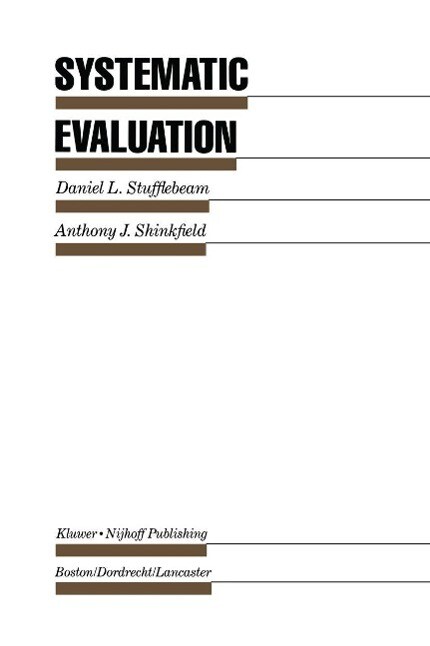Zur Zeit liegt uns keine Inhaltsangabe vor.
Inhaltsverzeichnis
1 Introduction to Evaluation. - Objectives. - What Is Evaluation? . - Methods. - Standards. - History. - Roles in Evaluation Work. - Knowledge Test for Unit 1. - Application Exercise. - Questions Without Answers. - References. - 2 An Analysis of Alternative Approaches to Evaluation. - Objectives. - Alternative Conceptualizations of Evaluation. - Pseudoevaluation. - Quasievaluations. - True Evaluations. - Conclusion. - Knowledge Test for Unit 2. - Application Exercises. - Questions Without Answers. - References. - 3 Objectives-oriented Evaluation: The Tylerian Tradition. - Objectives. - The Intention of the Tylerian Approach. - Some Limitations of the Tylerian Approach. - Metfessel and Michael: An Extension of the Tylerian Approach. - Knowledge Test for Unit 2. - Application Exercises. - Questions Without Answers. - References. - 4 Edward A. Suchman and the Scientific Approach to Evaluation. - Objectives. - Conceptual Aspects of Evaluation. - Methodological Aspects of Evaluation. - Evaluation and Program Administration. - Knowledge Test for Unit 4. - Questions Without Answers. - References. - 5 Cronbach s Designing Evaluations: A Synopsis. - Objectives. - to the Issues. - Cronbach s Concepts of the Elements in an Evaluation Design: Uto. - Planning for Communication. - The Promise of Evaluation. - Knowledge Test for Unit 5. - Application Exercises. - Questions Without Answers. - References. - 6 Stufflebeam s Improvement-oriented Evaluation. - Objectives. - Some Personal History. - Development of the CIPP Model. - The PDK Study Committee s Elaboration of CIPP Evaluation. - CIPP Compared to Other Recent Evaluation Proposals. - CIPP as a Strategy for Improving Systems. - An Overview of CIPP Categories. - Designing Evaluations. - Metaevaluation and Standards. - Conclusion. - Knowledge Test for Unit 6. - Application Exercises. -Questions Without Answers. - References. - 7 Stake s Client-centered Approach to Evaluation. - Objectives. - The Countenance Statement of Evaluation. - Format for Data Collection. - Responsive Evaluation. - General Observations. - Knowledge Test for Unit 7. - Application Exercises. - Questions Without Answers. - References. - 8 T. R. Owens, R. L. Wolf: An Adversary Approach to Evaluation. - Objectives. - Intention of the Adversary Model. - One Form of the Adversary Approach: Wolf s Judicial Model. - Pros and Cons of Adversary Evaluation. - Knowledge Test for Unit 8. - Application Exercises. - Questions Without Answers. - References. - 9 Illuminative Evaluation: The Holistic Approach. - Objectives. - Traditional Evaluation: Seeds of Doubt. - Stake s Concept of Evaluation as Portrayal. - Illuminative Evaluation: A Social-Anthropological Paradigm. - The Context of Educational Programs. - Organization and Methods of Illuminative Evaluation. - Reporting and Decision Making. - Problems Associated with Illuminative Evaluation. - Knowledge Test for Unit 9. - Application Exercises. - Questions Without Answers. - References. - 10 Michael Scrlven s Consumer-Oriented Approach to Evaluation. - Objectives. - Evaluation Defined. - Critique of Other Persuasions. - Formative and Summative Evaluation. - Amateur versus Professional Evaluation. - Intrinsic and Payoff Evaluation. - Goal-free Evaluation. - Needs Assessment. - The Key Evaluation Checklist. - Metaevaluation. - Evaluation Ideologies. - Professionalization of Evaluation. - Knowledge Test for Unit 10. - Application Exercises. - Questions Without Answers. - References. - Indexes.


































